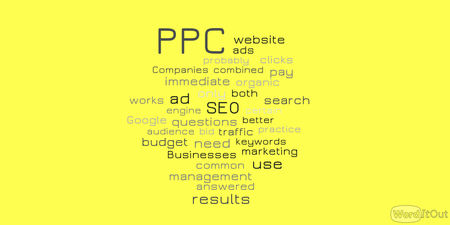 Pay per click (PPC) can throw up a lot of questions for the uninitiated, so I consulted ‘Answer The Public’ to find out what the most common queries are.
Pay per click (PPC) can throw up a lot of questions for the uninitiated, so I consulted ‘Answer The Public’ to find out what the most common queries are.
Are PPC and SEM the same?
No, although there is some overlap. PPC stands for ‘pay per click’ and refers to the practice of paying Google to place an ad to your website alongside its organic search results. SEM stands for search engine marketing, and refers to all marketing involving search engines – including both SEO and PPC.
How PPC works
You write an advert (or multiple adverts) linking to your website, and enter your preferred user keyword phrases you would like your ad(s) to appear for. Then you assign a ‘bid’ and a total monthly budget to it. The size of your bid combined with the quality of your website will influence the ad’s rankings in the search results. When the advert is posted, you will only pay for users’ clicks on the ad.
When to use PPC
Businesses tend to use PPC when they require immediate results, for example to boost awareness of an offer or event. Unlike SEO, as soon as you’ve published your ad and set your budget, you’ll start to receive traffic from it. Businesses also use PPC to target specific audience demographics – for example, you could ensure your ad only reaches people in certain areas of the country. Companies also use PPC to ‘level the playing field’ with competitors. It’s extremely difficult to rank highly for competitive keywords with SEO alone, but PPC enables you to rank highly for almost any keyword – for a price of course.
Which is better: PPC or SEO?
Both PPC and SEO can be effective, and both work very well together. But if you’ve only budget enough for one, then which you use will depend on your marketing needs: do you need immediate results? Do you need to reach a specific audience? If so, PPC will probably work best for you. Do you need an affordable, long-term increase in organic traffic? Then SEO is probably better. If you need all of the above, then a combined strategy is needed.
Why PPC works
It’s fast, targeted, drives revenue and gets you immediate results. You only pay for ad clicks meaning if no-one clicks your ad you don’t have to pay for it even if it’s got top billing – and for this reason, it’s a guaranteed return on investment in terms of driving web traffic. However do be aware that increasing web traffic doesn’t necessarily translate to a higher conversion rate – your ad and your website must both be of a high quality to encourage clicks and drive sales.
What is PPC management?
PPC management simply refers the management of your PPC account(s) – this might be across social media and Google or it might be on a single platform. PPC management usually involves keeping an eye on your various ads, and analysing which ads and keywords are providing you with the most click-throughs and the best ROI. Many businesses choose to outsource the management of their PPC to specialist companies who can help them to tailor their ads and drive the best possible ROI.
Who should use PPC?
Anyone in need of immediate and targeted web traffic, regardless of budget size.
Where do PPC ads appear?
PPC ads on Google appear above and alongside organic results, and are flagged with a yellow ‘ad’ label, like this:

Read more
The Difference Between SEO and PPC: Six Common Questions Answered
Six Essential Places to Put Keywords for Website SEO Success
[bctt tweet=”How does PPC work? …and seven other common #PPC questions answered”]
